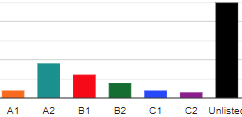Comparatives adjectives can be used to compare two things. In the English Grammar Profile, A2 point 29 in the category of ADJECTIVES is defined:
form comparative adjectives with adjectives of two syllables ending in ‘-y’ by changing the ‘y’ to an ‘i’ and adding ‘-er’
For example:
easy → easier
I’m asking you to consider making this decision a little easier.
happy → happier
I‘m fine.
I‘m happier than I‘ve ever been.
Here is a list of A2 adjectives with example sentences created by AI. However, many of these are examples of much more complex grammar.
- Angrier:
- Busier:
- The city was busier than usual on the day of the parade.
- The office was busier than ever before. = than it has been ever before
- Cloudier:
- The sky was cloudier today than yesterday.
- The forecast says it will be cloudier tomorrow.
- Crazier:
- This day is getting crazier by the minute.
- Dirtier:
- The streets were dirtier than usual after the storm.
- The kitchen was dirtier than I thought it would be.
- Drier:
- Earlier:
- I woke up earlier than usual today.
- The meeting started earlier than expected.
- Friendlier:
- The people in this town are friendlier than in the city.
- The dog was friendlier than I expected.
- Healthier:
- I feel healthier since I started eating better.
- The baby is healthier now than he was a few weeks ago.
- Heavier:
- The new car is heavier than my old one.
- This backpack is heavier than I thought it would be.
- Lazier:
- I’m feeling lazier than usual today.
- The cat is lazier than ever before.
- Lovelier:
- The view from the top of the mountain was lovelier than I imagined.
- Luckier:
- I feel luckier than ever since I met you.
- Noisier:
- The concert was noisier than I expected.
- The kids are being noisier than usual today.
- Prettier:
- That dress is prettier than the other one.
- The flowers in the garden are prettier than ever before.
- Sunnier:
- The weather is sunnier today than yesterday.
- The beach is sunnier than I thought it would be.
- Tidier:
- The room is tidier now than it was before.
- The desk is tidier than I thought it would be.
- Windier:
- The wind was windier today than yesterday.
- The forecast says it will be windier tomorrow.
EXPERT EXAMPLE:
The column included examples of correct grammar
that make speeches and writing easier to understand,
whereas mistakes make English weaker and uncomfortable.
An iWeb search for:
*ier_JJR
1 EASIER 1010581
2 EARLIER 431393
3 HEALTHIER 186940
4 HEAVIER 159937
5 HAPPIER 141736
6 DRIER 21493
7 THIER 19909
8 TRICKIER 18511
9 BUSIER 18381
10 PRETTIER 15302
11 OUTLIER 13455
12 WEALTHIER 12983
13 FUNNIER 11585
14 RISKIER 11322
15 PRICIER 11313
16 FRIENDLIER 9650
17 MESSIER 9364
18 STURDIER 9183
19 SCARIER 8573
20 FANCIER 8285
21 TASTIER 7780
22 SEXIER 7516
23 CRAZIER 7128
24 BULKIER 6535
25 SHINIER 5192
26 SPORTIER 5179
27 NOISIER 4748
28 MERRIER 4649
29 HOOSIER 4608
30 RAINIER 4598
31 CREAMIER 4587
32 UGLIER 4568
33 DIRTIER 4323
34 BEEFIER 4284
35 SPEEDIER 4054
36 SUNNIER 4041
37 ANGRIER 3984
38 SKINNIER 3973
39 LUCKIER 3787
40 HUNGRIER 3755
41 EDGIER 3596
42 ROOMIER 3538
43 LIVELIER 3390
44 ZAPIER 3356
45 FRAZIER 3338
46 MIGHTIER 3123
47 COSTLIER 3088
48 LENGTHIER 3070
49 SPICIER 3024
50 STEADIER 2931
51 NASTIER 2929
52 STICKIER 2897
54 CLASSIER 2784
55 CHUNKIER 2729
56 HOLIER 2641
57 DEADLIER 2624
58 HARDIER 2623
59 DRESSIER 2611
61 GRITTIER 2478
62 LIKELIER 2415
63 FLUFFIER 2333
64 BOSSIER 2303
65 SNAPPIER 2265
66 MEATIER 2177
67 LOFTIER 2106
68 SILLIER 2056
69 JUICIER 2024
70 CREEPIER 1982
71 HEFTIER 1980
72 HEARTIER 1968
73 FLASHIER 1934
74 SALTIER 1915
75 CHILLIER 1902
76 LAZIER 1882
77 TIDIER 1863
78 MURKIER 1789
79 TINIER 1752
80 ROSIER 1747
81 WEIGHTIER 1701
82 COZIER 1669
83 CRISPIER 1663
86 TRENDIER 1553
87 BUSTIER 1545
88 GLOSSIER 1502
90 HANDIER 1455
91 LOVELIER 1432
92 PUNCHIER 1428
93 CLOUDIER 1410
95 WINDIER 1331
96 OILIER 1284
97 FUNKIER 1276
99 FUZZIER 1214
—
Text inspector doesn’t capture most of these:
A2: angrier, busier, cloudier, crazier, dirtier, drier, earlier, friendlier, healthier, heavier, lazier, lovelier,
luckier, noisier, prettier, sunnier, tidier, windier
B1: juicier, livelier, messier, nastier, scarier, shinier, sillier, spicier, stickier, tastier, tinier, uglier
B2: bossier, deadlier, riskier, saltier, sexier, steadier, trickier, wealthier
C1: bulkier, chillier, holier, sportier
C2: handier, mightier, rosier
There are a few ways to form comparative adjectives in English:
One-Syllable Adjectives: For most one-syllable adjectives, the comparative is formed by adding the suffix “-er” (or just “-r” if the adjective already ends in “e”). For example, “old” becomes “older” and “nice” becomes “nicer”.
Two-Syllable Adjectives Ending in “-y”: If a two-syllable adjective ends in “-y”, we change “-y” to “-i” and add “-er”. For example, “happy” becomes “happier” and “easy” becomes “easier”.
Two-Syllable Adjectives: For most two-syllable adjectives (and all adjectives with three or more syllables), we use “more” before the adjective to form the comparative. For example, “careful” becomes “more careful” and “interesting” becomes “more interesting”. However, with some two-syllable adjectives, you can either add “-er / -r” or use “more”. Examples include “common”, “cruel”, “gentle”, “handsome”, “likely”, “narrow”, “pleasant”, “polite”, “simple”, and “stupid”12.
Irregular Adjectives: Some adjectives have irregular comparative forms. For instance, “good” becomes “better”, “bad” becomes “worse”, and “far” can become either “further” or “farther”.
Remember, when comparing two things, we often use the word “than”. For example, “She is older than me.”
The rule does apply for word that can also be adverbs, two adverbs in particular: easier and earlier
early → earlier

